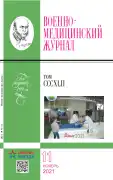Assessment of the difficulty and uncertainty of the situation in young people who have undergone COVID-19
- Authors: Ulyukin I.M.1, Sechin A.A.1, Bolekhan V.N.1, Orlova E.S.1, Shuklina A.A.1
-
Affiliations:
- The S.M.Kirov Military Medical Academy of the Ministry of Defense of the Russian Federation
- Issue: Vol 342, No 11 (2021)
- Pages: 46-51
- Section: Treatment and prophylactic issues
- URL: https://journals.eco-vector.com/0026-9050/article/view/628162
- DOI: https://doi.org/10.52424/00269050_2021_342_11_46
- ID: 628162
Cite item
Abstract
The features of assessing the difficulty and uncertainty of the situation (using the example of an infection with the SARS-CoV-2 virus) in young people who have undergone COVID-19 in the process of rehabilitation have been studied. We examined 62 male convalescents aged 22.83± 0.37 years who had undergone the main clinical forms of COVID-19 according to the «Situation Difficulty and Uncertainty Assessment Scale» method. It is shown that the integral indicator of the method has intermediate values between low and low standards, and the data on the correlation between its scales indicate the direction of a possible improvement in the medical and psychological support of such convalescents.
About the authors
I. M. Ulyukin
The S.M.Kirov Military Medical Academy of the Ministry of Defense of the Russian Federation
Author for correspondence.
Email: igor_ulyukin@mail.ru
кандидат медицинских наук, подполковник медицинской службы запаса
Russian Federation, St. PetersburgA. A. Sechin
The S.M.Kirov Military Medical Academy of the Ministry of Defense of the Russian Federation
Email: igor_ulyukin@mail.ru
майор медицинской службы
Russian Federation, St. PetersburgV. N. Bolekhan
The S.M.Kirov Military Medical Academy of the Ministry of Defense of the Russian Federation
Email: igor_ulyukin@mail.ru
доцент, полковник медицинской службы
Russian Federation, St. PetersburgE. S. Orlova
The S.M.Kirov Military Medical Academy of the Ministry of Defense of the Russian Federation
Email: igor_ulyukin@mail.ru
кандидат медицинских наук
Russian Federation, St. PetersburgA. A. Shuklina
The S.M.Kirov Military Medical Academy of the Ministry of Defense of the Russian Federation
Email: igor_ulyukin@mail.ru
Russian Federation, St. Petersburg
References
- Водопьянова Н.Е. Психодиагностика стресса. – СПб: Питер, 2009. – 336 с.
- Временные методические рекомендации. Профилактика, диагностика и лечение новой коронавирусной инфекции (COVID-19). Версия 10 (08.02.2021). – М., 2021. – 261 с.
- Демкин А.Д., Овчинников Д.В., Юсупов В.В. и др. Психологические особенности медицинского персонала и курсантов (студентов) в условиях неблагоприятной эпидемиологической обстановки // Известия Рос. воен.-мед. акад. – 2020. – Т. 39, № 2. – С. 55–60.
- Зайцев А.А., Чернов С.А., Крюков Е.В. и др. Практический опыт ведения пациентов с новой коронавирусной инфекцией COVID-19 в стационаре (предварительные итоги и рекомендации) // Лечащий врач. – 2020. – № 6. – С. 74–79.
- Крайнюков П.Е., Демьяненко А.В., Афонасков О.В., Гудантов Р.Б., Попов А.В., Диева Т.В. Опыт лечения тяжелой формы коронавирусной инфекции covid-19 в центральном военном госпитале // Воен.-мед. журн. – 2020. – Т. 341. № 10. – С. 63–66.
- Совет Европы: Конвенция о защите личности в связи с автоматической обработкой персональных данных. 2-е изд., доп. – СПб: Гражданский контроль, 2002. – 36 с.
- Сун К.Э. Факторы совладающего поведения // Integral. – 2019. – № 3. – С. 163–173.
- Юнкеров В.И., Григорьев С.Г., Резванцев М.В. Математико-статистическая обработка данных медицинских исследований. – СПб: ВМедА, 2011. – 318 с.
- Dennis A., Wamil M., Kapur S. et al. Multi-organ impairment in low-risk individuals with long COVID // medRxiv. – 2020. – 10.14.20212555. – URL: doi: https://doi.org/10.1101/2020.10.14. 20212555 (дата обращения: 06.04.2021).
- Greenhalgh T. Management of post-acute covid-19 in primary care // BMJ. – 2020. – N 370. – m3026.
- Lambert N.J., Survivor Corps. COVID-19 «Long Hauler» Symptoms Survey Report. – US: Indiana University School of Medicine, 2020. – 13 р.
- Lei L., Huang X., Zhang S. et al. Comparison of Prevalence and Associated Factors of Anxiety and Depression Among People Affected by versus People Unaffected by Quarantine During the COVID-19 Epidemic in Southwestern China // Med. Sci. Monit. – 2020. – N 26. – Аrt. e924609.
- Maxwell E. Living with Covid19. A dynamic review of the evidence around ongoing Covid19 symptoms (often called Long Covid). – UK: NIHR, 2020. – 29 p.
- Nabavi N. Long covid: How to define it and how to manage it // BMJ. – 2020. – N 370. – m3489.
- Sleat D., Wain R., Miller B. Long Covid: Reviewing the Science and Assessing the Risk. – UK: Tony Blair Institute for Global Change, 2020. – 18 p.
- Sudre C.H., Murray B., Varsavsky T. et al. Attributes and predictors of Long-COVID: analysis of COVID cases and their symptoms collected by the Covid Symptoms Study App // medRxiv. – 2020. – 10.19.20214494. – URL: doi: https://doi.org/10.1101/2020.10.19.20214494 (дата обращения: 02.04.2021).
- Zimmermann P., Curtis N. Coronavirus Infections in Children Including COVID-19: An Overview of the Epidemiology, Clinical Features, Diagnosis, Treatment and Prevention Options in Children // Pediatr. Infect. Dis. J. – 2020. – Vol. 39, N 5. – Р. 355–368.
Supplementary files







